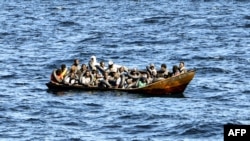The European Union reached agreement early on Wednesday on new rules designed to share out the cost and work of hosting migrants more evenly and to limit the numbers of people coming in.
Representatives of the European Parliament and of EU governments reached an accord after all-night talks on EU laws collectively called the New Pact on Migration and Asylum that should take effect next year.
The laws cover screening irregular migrants when they arrive in the European Union, procedures for handling asylum applications, rules on determining which EU country is responsible for handling applications and ways to handle crises.
Migrant arrivals in the European Union are way down from the 2015 peak of more than 1 million, but have steadily crept up from a 2020 low to 255,000 in the year to November, with more than half crossing the Mediterranean from Africa to Italy or Malta.
Previous efforts to share out the responsibility of hosting migrants have foundered because eastern EU members in particular were unwilling to take in people who had arrived in Greece, Italy and other countries.
Under the new system, countries not at the border will have a choice between accepting refugees or paying into an EU fund.
The screening system envisaged will seek to distinguish between those in need of international protection and others who are not.
People whose asylum applications have a low chance of success, such as those from India, Tunisia or Turkey, can be prevented from entering the EU and detained at the border, as can people seen as representing a threat to security.
Refugee rights groups have said it will create what amounts to prison camps at the EU's borders.






